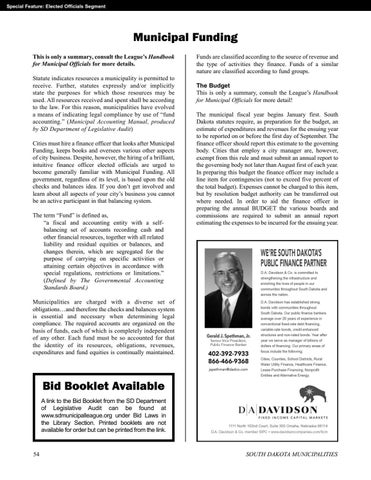Special Feature: Elected Officials Segment
Municipal Funding This is only a summary, consult the League’s Handbook for Municipal Officials for more details. Statute indicates resources a municipality is permitted to receive. Further, statutes expressly and/or implicitly state the purposes for which those resources may be used. All resources received and spent shall be according to the law. For this reason, municipalities have evolved a means of indicating legal compliance by use of “fund accounting.” (Municipal Accounting Manual, produced by SD Department of Legislative Audit) Cities must hire a finance officer that looks after Municipal Funding, keeps books and oversees various other aspects of city business. Despite, however, the hiring of a brilliant, intuitive finance officer elected officials are urged to become generally familiar with Municipal Funding. All government, regardless of its level, is based upon the old checks and balances idea. If you don’t get involved and learn about all aspects of your city’s business you cannot be an active participant in that balancing system. The term “Fund” is defined as, “a fiscal and accounting entity with a selfbalancing set of accounts recording cash and other financial resources, together with all related liability and residual equities or balances, and changes therein, which are segregated for the purpose of carrying on specific activities or attaining certain objectives in accordance with special regulations, restrictions or limitations.” (Defined by The Governmental Accounting Standards Board.)
Funds are classified according to the source of revenue and the type of activities they finance. Funds of a similar nature are classified according to fund groups. The Budget This is only a summary, consult the League’s Handbook for Municipal Officials for more detail! The municipal fiscal year begins January first. South Dakota statutes require, as preparation for the budget, an estimate of expenditures and revenues for the ensuing year to be reported on or before the first day of September. The finance officer should report this estimate to the governing body. Cities that employ a city manager are, however, exempt from this rule and must submit an annual report to the governing body not later than August first of each year. In preparing this budget the finance officer may include a line item for contingencies (not to exceed five percent of the total budget). Expenses cannot be charged to this item, but by resolution budget authority can be transferred out where needed. In order to aid the finance officer in preparing the annual BUDGET the various boards and commissions are required to submit an annual report estimating the expenses to be incurred for the ensuing year.
Municipalities are charged with a diverse set of obligations…and therefore the checks and balances system is essential and necessary when determining legal compliance. The required accounts are organized on the basis of funds, each of which is completely independent of any other. Each fund must be so accounted for that the identity of its resources, obligations, revenues, expenditures and fund equities is continually maintained.
Bid Booklet Available A link to the Bid Booklet from the SD Department of Legislative Audit can be found at www.sdmunicipalleague.org under Bid Laws in the Library Section. Printed booklets are not available for order but can be printed from the link.
54
SOUTH DAKOTA MUNICIPALITIES



















